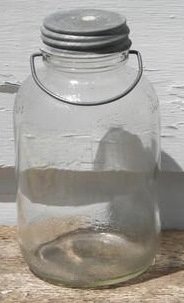Chief Longwind Of The North
Certified/Certifiable
It's really too bad that people are afraid of irradiated food. They seem to think that the process makes the product radioactive, when in fact, materials become radioactive when radioactive dust is present on the material. Irradiated products are exposed to gamma radiation, that is photons that travel with a very short wavelength and a lot of power. Those same photons are transmitted by the sun as infra-red, visible light colors, ultraviolet, x-rays, and gamma rays. There are no residual radioactive particles left on the food.
With gamma radiation, the energy released is strong enough to destroy any and all pathogens in the product. Plus, they travel through the container holding the food. So, you could package the food in a hermetically sealed container, and pass it through a gamma-ray emitter, and have raw meat, or raw milk, or raw veggies that are shelf stable, that is if they don't contain natural enzymes in the food that will break the food down.
If gamma radiation was used widespread, it would eliminate the need for as much refrigeration, and pressure canning, which often turns food to mush.
But we have shown time and again, that if we don't have the personal training and expertise in any area, we fear the technology and assign baseless assumptions on that technology.
We think we are so very clever, and yet we destroy our own planet, the one that we depend on for life. Green paper, and plastic cards are more important than the survival of our species.
Oh, wait, I'm now off-topic. This was about the quality of milk, and making it shelf stable, while still tasting like raw milk. I'm going away now.
Seeeeeya; Chief Longwind of the North
With gamma radiation, the energy released is strong enough to destroy any and all pathogens in the product. Plus, they travel through the container holding the food. So, you could package the food in a hermetically sealed container, and pass it through a gamma-ray emitter, and have raw meat, or raw milk, or raw veggies that are shelf stable, that is if they don't contain natural enzymes in the food that will break the food down.
If gamma radiation was used widespread, it would eliminate the need for as much refrigeration, and pressure canning, which often turns food to mush.
But we have shown time and again, that if we don't have the personal training and expertise in any area, we fear the technology and assign baseless assumptions on that technology.
We think we are so very clever, and yet we destroy our own planet, the one that we depend on for life. Green paper, and plastic cards are more important than the survival of our species.
Oh, wait, I'm now off-topic. This was about the quality of milk, and making it shelf stable, while still tasting like raw milk. I'm going away now.
Seeeeeya; Chief Longwind of the North
Last edited:




